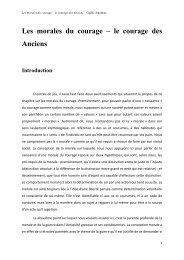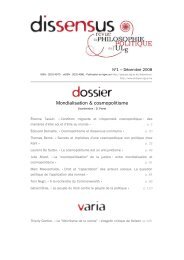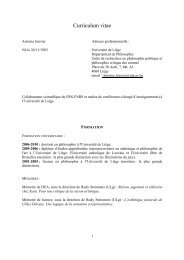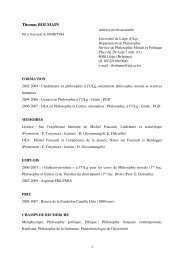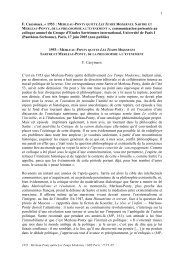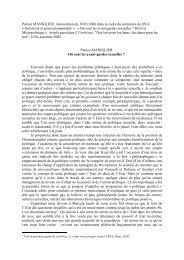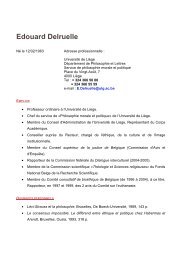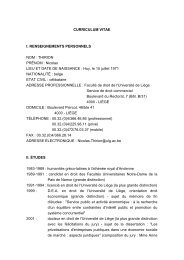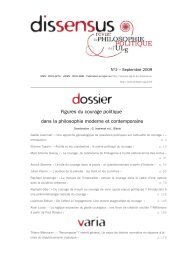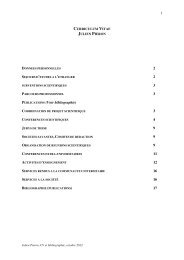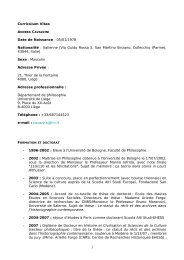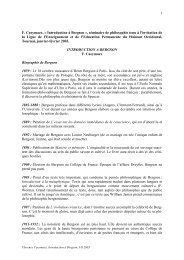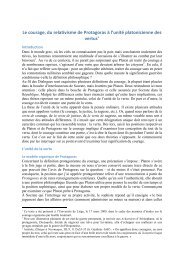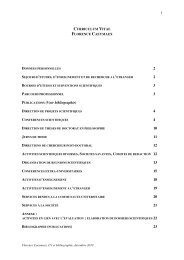Subjectivations politiques et économie des savoirs - Service de ...
Subjectivations politiques et économie des savoirs - Service de ...
Subjectivations politiques et économie des savoirs - Service de ...
Create successful ePaper yourself
Turn your PDF publications into a flip-book with our unique Google optimized e-Paper software.
– Sophie Bourgault: « Prolegomena to a rehabilitation of Platonic mo<strong>de</strong>ration » – p. 133<br />
H. North conclu<strong><strong>de</strong>s</strong> that Plato is the only writer not to have gen<strong>de</strong>red the virtue of<br />
sophrosyne nor to have established any particular connection b<strong>et</strong>ween it and women. 41<br />
It seems significant that in the Laws (773c) the Athenian stranger insists that<br />
mo<strong>de</strong>rate and brash characters can be found both in male and female citizens, and<br />
that Book V of the Republic puts forward a non-gen<strong>de</strong>red account of the virtues. While<br />
there are a few passages in the Platonic corpus where sophron music is associated<br />
with the feminine (e.g. Laws 802d) 42 , Plato is remarkably uninterested in female silence<br />
and chastity – a fact so remarkable that for the philologist A. Ra<strong>de</strong>maker, it must<br />
simply have been the result of an oversight on Plato’s part. 43<br />
A. Ra<strong>de</strong>maker seems<br />
unable to entertain the possibility that most of what Plato has to say about mo<strong>de</strong>ration<br />
in citizens may equally apply to both sexes.<br />
This is not to suggest that Plato is compl<strong>et</strong>ely uninterested in qui<strong>et</strong>ness and<br />
mo<strong><strong>de</strong>s</strong>ty/shame, but only to suggest that these are not the marks of female virtue. 44 In<br />
the Charmi<strong><strong>de</strong>s</strong> and Symposium, it is Socrates who is hailed for his tremendous<br />
capacity to control his <strong><strong>de</strong>s</strong>ires when put in contact with young boys. And if a superficial<br />
reading of the Charmi<strong><strong>de</strong>s</strong> could suggest that Plato rejects the connections b<strong>et</strong>ween<br />
mo<strong>de</strong>ration, gentleness and qui<strong>et</strong>ness, the Statesman, Republic and Laws all make it<br />
clear that these traits are (when appropriate) part of what mo<strong>de</strong>ration consists of<br />
(Statesman 307a, Republic 410e). As such, Ni<strong>et</strong>zsche is partially correct to see<br />
som<strong>et</strong>hing « monkish » in Platonic sophrosyne, since it entails a fair <strong>de</strong>gree of calm,<br />
tranquility and a <strong>de</strong>creasing of the intensity of our physical impulses (Laws 734a). If,<br />
for Plato, this calm is necessary for philosophy and for experiencing of true (and thus<br />
b<strong>et</strong>ter) pleasure, for Ni<strong>et</strong>zsche this « mildness » is envisioned as mediocrity. To seek<br />
mo<strong>de</strong>rate passions is the mark of the priest and impotent, and it entails the forfeiting<br />
of our capacity to be creative and free. 45 For Ni<strong>et</strong>zsche, it is disor<strong>de</strong>r in the soul and<br />
frenzy that leads to great <strong>de</strong>eds and i<strong>de</strong>as – not tranquility. In Thus Spoke Zarathustra,<br />
Ni<strong>et</strong>zsche <strong><strong>de</strong>s</strong>cribes the morality of last men as follows:<br />
virtue to them is that which makes mo<strong><strong>de</strong>s</strong>t and tame: with that they have<br />
turnedthe wolf into a dog and man himself into man’s best domestic animal.<br />
« We have placed our chair in the middle », your smirking says to me; « and<br />
41<br />
42<br />
43<br />
44<br />
45<br />
H. North, From Myth to Icon, Ithaca, Cornell University Press, 1979, p. 49.<br />
But see Republic 431b, where Plato lumps tog<strong>et</strong>her children, slaves and women in his list of<br />
immo<strong>de</strong>rate individuals.<br />
A. Ra<strong>de</strong>maker, Sophrosyne and the Rh<strong>et</strong>oric of Self-Restraint, p. 295 <strong>et</strong> 353.<br />
In Republic (388d), Plato speaks of shame and self-restraint almost in the same breath. On shame,<br />
see also the Charmi<strong><strong>de</strong>s</strong> (160e-161b).<br />
Due to space concerns, I can only offer the briefest (hence superficial) reading of Ni<strong>et</strong>zsche. A more<br />
sustained discussion would point out that Ni<strong>et</strong>zsche was more Platonic than he thought: he craved for<br />
a calmness of soul and a self-control that has much to do with Platonic sophrosyne in my view.



